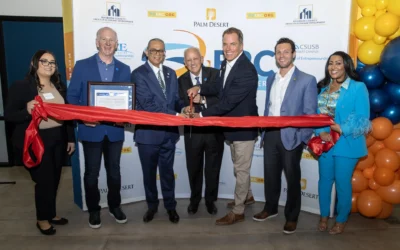In a bold move to address the affordable housing shortage in the city and the Greater Palm Springs region overall, the Palm Springs City Council has approved a significant project with Neighborhood Partnership Housing Services Inc. (NPHS). The initiative, focusing on the development of six eco-friendly single-family homes, targets low-income first-time homebuyers in the Desert Highland Estates neighborhood. This venture marks a pioneering effort in Riverside County, utilizing a community land trust (CLT) model to ensure long-term affordability.
Project Overview
The NPHS proposal, reviewed and approved on May 23, involves selling three city-owned parcels and providing financial assistance for constructing the homes. These parcels, located at 233 West Tramview Road, the west side of El Dorado Boulevard south of West Tramview Road, and Rosa Parks Road, were initially part of the Desert Highland Infill Program, which targeted moderate-income families.
The total estimated investment for this project is $2,815,570, comprising city contributions and external funding from sources like the Low Income Investment Fund facilitated by Lift to Rise. Each home, a unique blend of comfort and sustainability, will be approximately 1,500 square feet, featuring three bedrooms, two bathrooms, a two-car garage, solar panels, and battery storage systems. These innovative features are not only environmentally friendly but also designed to reduce long-term operating costs, making these homes a truly exciting prospect for the community.
Financial Structure and Support
The city will provide financial assistance through a Conditional Grant Agreement, covering a substantial portion of the construction costs. The homes, intended for households earning no more than 80% of the area median income (AMI), will remain affordable through a Community Land Trust managed by NPHS, including a 99-year affordability commitment.
Councilmember Christy Holstege emphasized the importance of this innovative approach, stating, “This project not only provides affordable housing but also ensures that these homes remain affordable for generations. It’s a sustainable solution that addresses the housing crisis head-on.”
Design and Environmental Sustainability
NPHS plans to use eco-friendly factory-built construction methods for these homes. The project will not significantly impact the environment, as it is not classified as a “Project” under the California Environmental Quality Act (CEQA). The city will ensure CEQA compliance before finalizing any definitive action.
Councilmember Grace Garner expressed enthusiasm, saying, “This initiative creates a pipeline of homeownership opportunities that are both affordable and sustainable. It’s a model that other cities can also look to as a solution to the housing crisis.”
Community Impact and Long-term Affordability
To ensure these homes remain affordable, they will be placed in a Community Land Trust (CLT) managed by NPHS. This arrangement allows homeowners to build equity while maintaining affordability, as the maximum sale price will be tied to the area median income rather than the speculative market.
Dev Goetschius, a CLT consultant, explained, “The home is owned by the homeowner, and the land is set aside as a community asset. This separation ensures that the homes remain affordable without additional subsidies from the city.”
The Palm Springs City Council unanimously supported the project, with members advocating for expanding the program to other city-owned lots. “I want to see us acquire more lots and explore creative ways to provide affordable housing,” said Councilmember Holstege.
Next Steps
The council is expected to move forward with the approval of the Disposition and Development Agreement (DDA) and the Conditional Grant Agreement, facilitating the transfer of properties and allocation of funds for the project. The homes are anticipated to be completed by winter 2025.
City Manager Scott C. Stiles highlighted the strategic importance of this project, noting, “This development aligns with our priority of improving the quality of life for our residents through affordable housing. It’s a significant step towards addressing the housing needs of our community.”
The Palm Springs City Council’s partnership with NPHS represents a forward-thinking approach to affordable housing, blending environmental sustainability with economic feasibility. As the project progresses, it promises to provide a model for other communities grappling with similar housing challenges.




